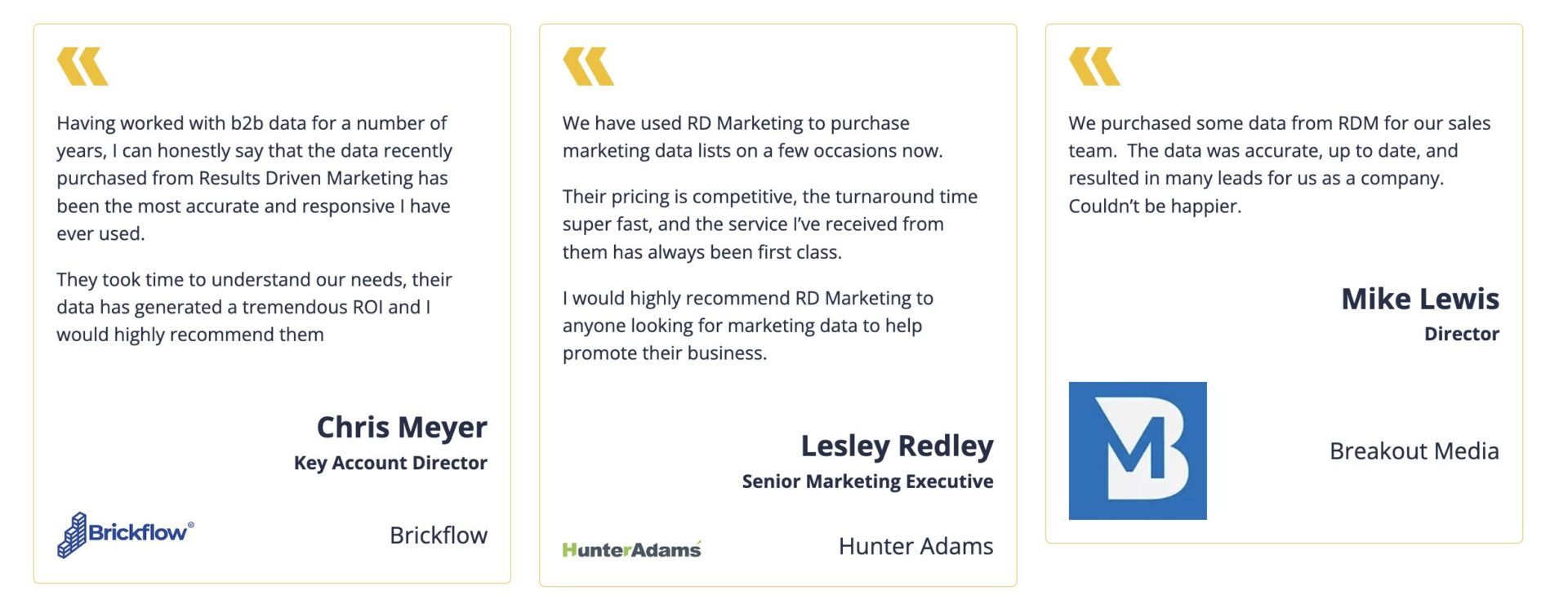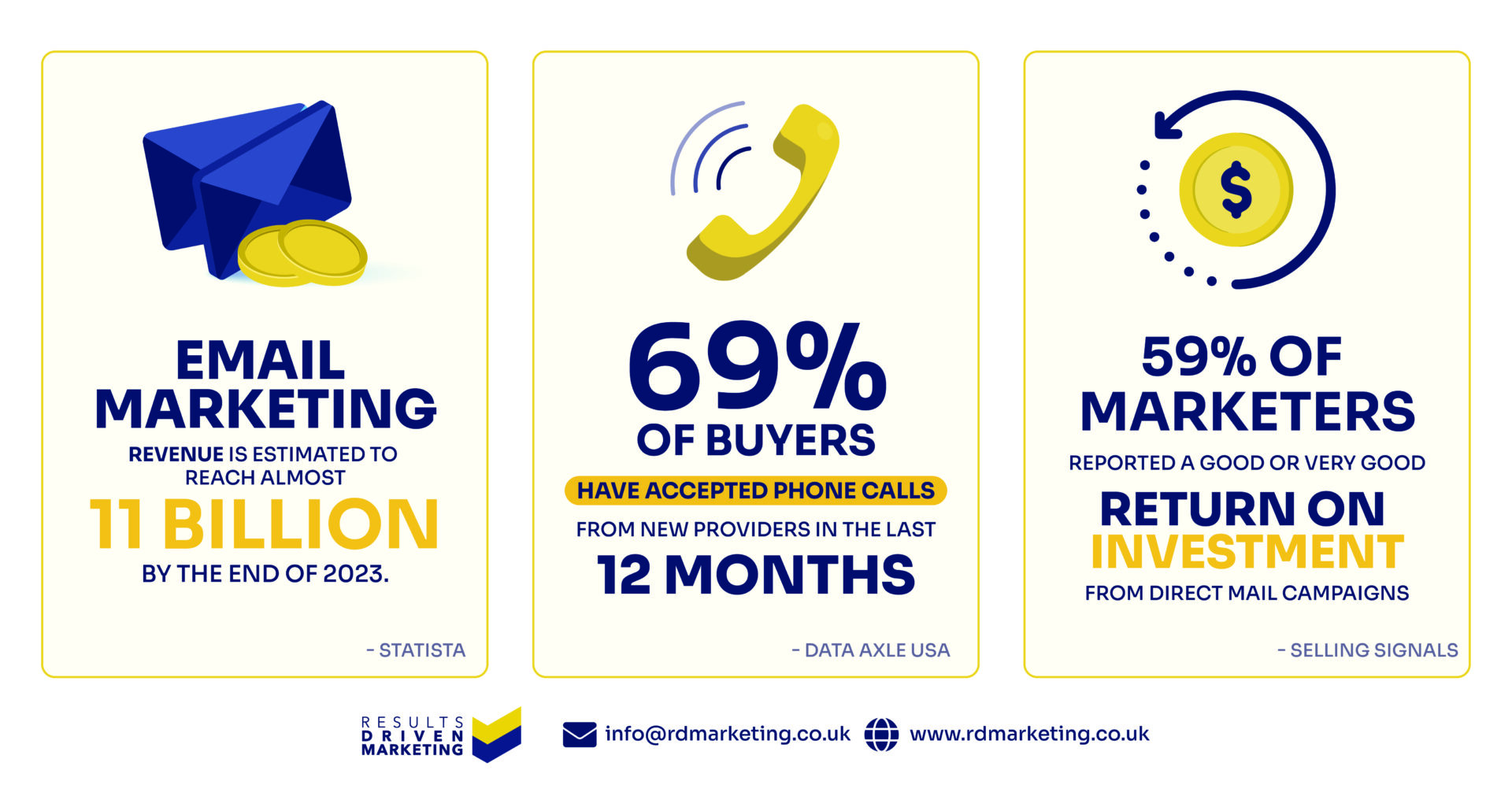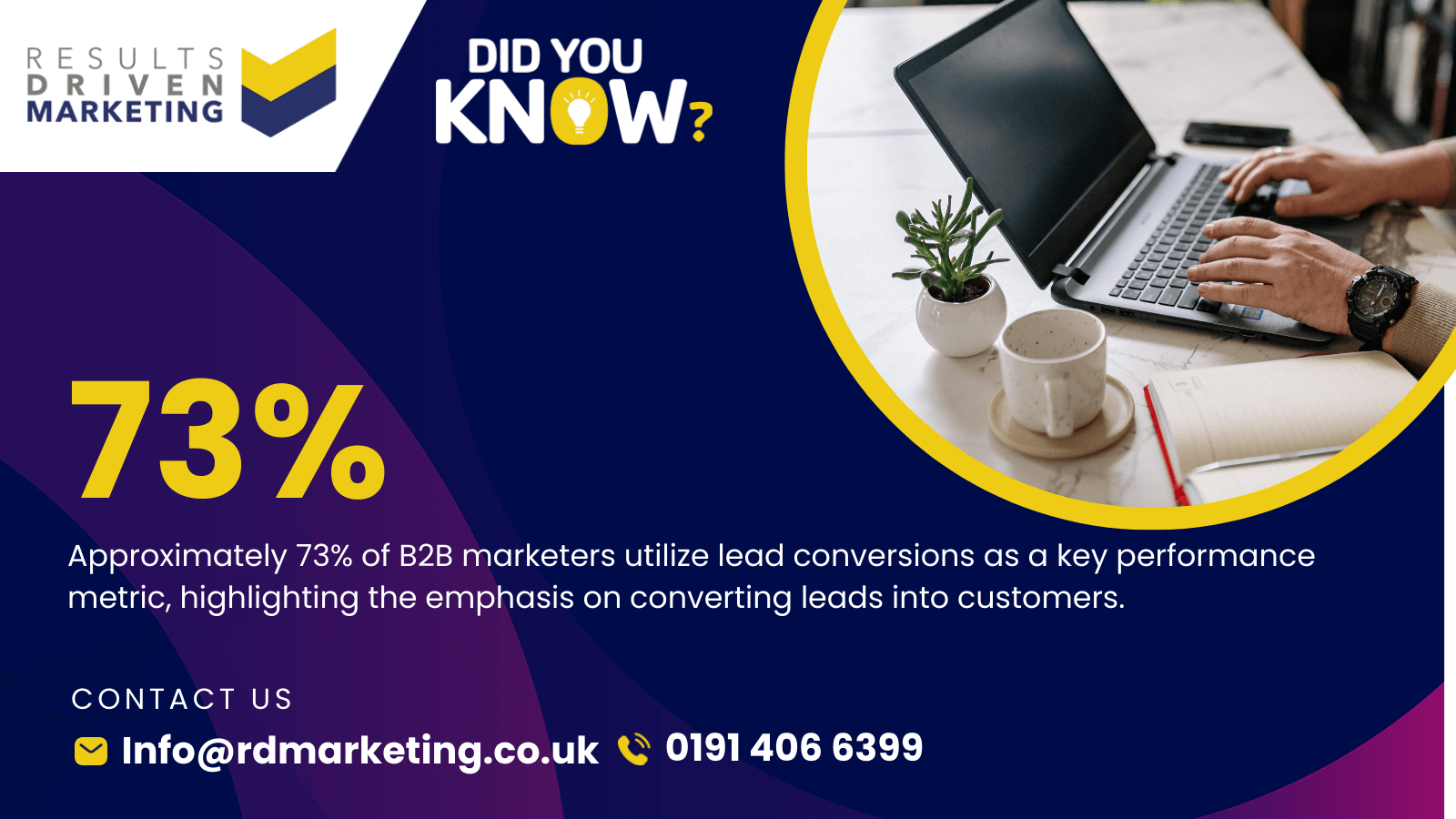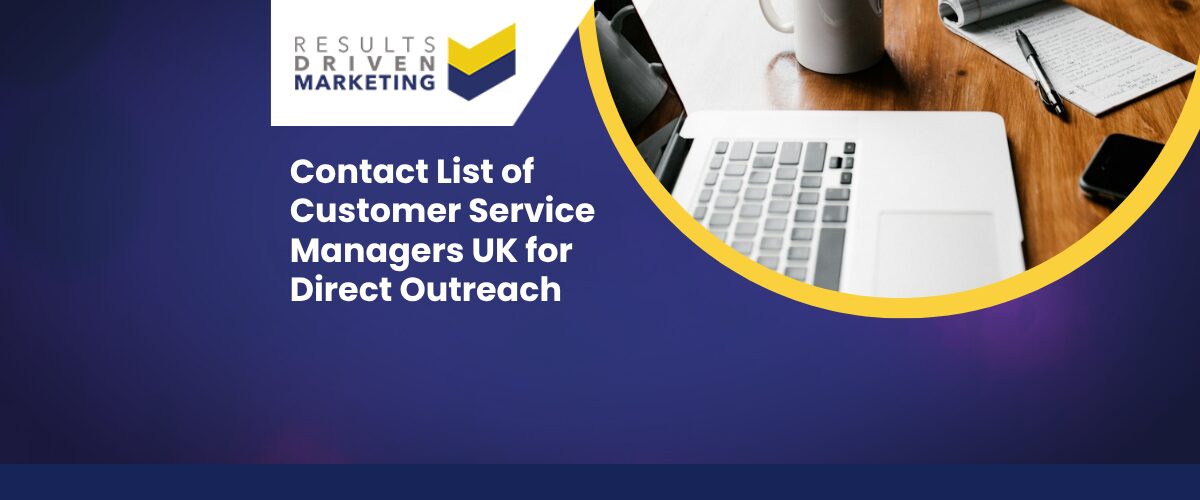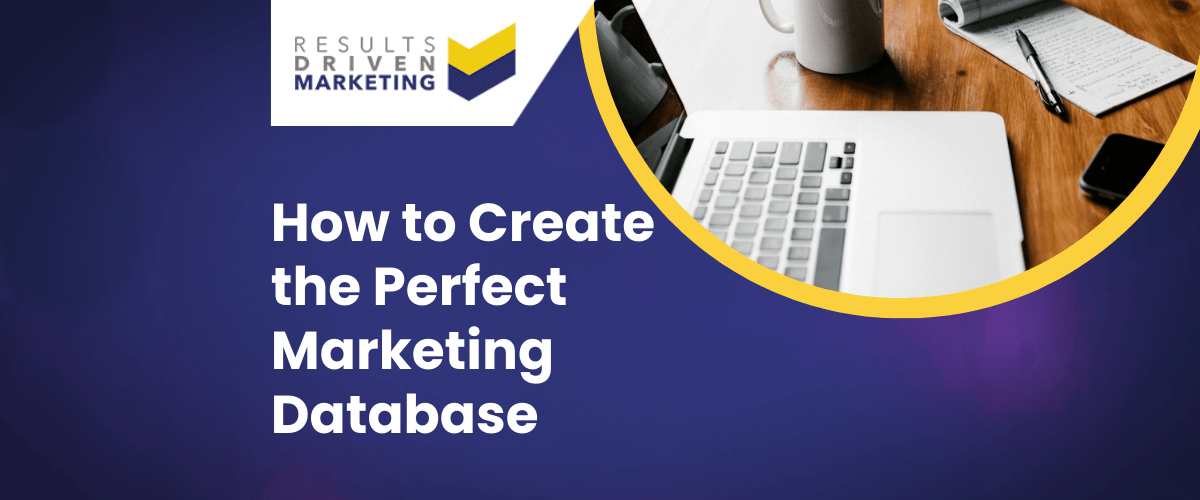
Marketing Database: Maximise ROI with Accurate Data
What is a Marketing Database?
A marketing database is, quite simply, the backbone of modern marketing. It’s a centralised collection of organised, accurate, and relevant information about your prospects and customers. This data serves as a treasure trove that enables businesses to execute personalised and highly targeted marketing campaigns. Whether you’re focusing on email outreach, direct mail, or even telemarketing, a robust marketing database is what ensures your efforts hit the mark.
Types of Business Marketing Databases
A marketing database is an essential tool for businesses looking to target their audience effectively. With the variety of options available, you can choose a database that aligns perfectly with your goals. Here are the main types of business marketing databases and how they can help:
1. Industry-Specific Databases
Target businesses within a specific sector, such as healthcare, construction, retail, or technology. These databases allow for focused campaigns, ensuring your message resonates with industry decision-makers.
2. Location-Based Databases
Designed to help businesses connect with prospects in specific regions, cities, or even postcodes. A location-based marketing database is ideal for local marketing campaigns or geographic expansions.
3. Decision-Maker Databases
Reach the key people who influence purchasing decisions, such as CEOs, managers, or procurement officers. These databases ensure your message is delivered directly to the individuals who matter most.
4. SME-Focused Databases
Perfect for targeting small and medium-sized enterprises. These marketing databases provide detailed information on SMEs, making them ideal for companies offering products or services tailored to smaller businesses.
5. Email Marketing Databases
A database optimised for email campaigns, including verified email addresses, ensures higher delivery rates and better engagement.
6. Multi-Channel Databases
Combine contact information for email, postal, and telephone campaigns, enabling you to run integrated marketing efforts across multiple channels.
7. Customisable Databases
Tailored marketing databases allow you to filter by industry, company size, or turnover, giving you complete control over your targeting strategy.
Choosing the right marketing database helps you connect with your ideal audience, increase campaign effectiveness, and maximize ROI. Understanding the types available ensures your marketing efforts are strategic and impactful.
The Role of a Marketing Database in Data-Driven Marketing
In today’s marketing landscape, data-driven strategies are non-negotiable. A marketing database acts as the cornerstone of these strategies by enabling you to:
- Segment Audiences: Break your database into meaningful groups based on demographics, behaviour, or buying stage.
- Enhance Targeting: Use insights to create campaigns that speak directly to your audience’s needs.
- Increase ROI: Spend your resources wisely by focusing only on leads that are most likely to convert.
- Ensure Compliance: Maintain ethical marketing practices by adhering to regulations like GDPR. Tools like our CTPS Checker can help you stay compliant.
Building a reliable marketing database doesn’t stop at collecting data. It requires consistent maintenance and enrichment. At RD Marketing, we specialise in Data Cleansing Services and Data Enrichment Services to ensure your marketing database stays accurate, actionable, and ready to deliver results.
Who Uses a Marketing Database?
A marketing database is an invaluable resource for businesses across various industries. It enables companies to connect directly with senior purchasing decision-makers within UK SMEs, making their marketing efforts more effective and targeted. Here’s who benefits from using a marketing database:
1. B2B Service Providers
IT companies, consultancy firms, and HR agencies use a marketing database to target SMEs needing their expertise.
2. Marketing and Advertising Agencies
Agencies leverage marketing databases to create tailored campaigns for their clients, ensuring maximum engagement and ROI.
3. Product Manufacturers
Businesses producing office equipment, software, or tools use the database to reach SME decision-makers directly.
4. Financial Service Providers
Banks, insurers, and lenders connect with SME owners and finance managers to offer tailored financial products.
5. Training and Development Firms
Companies offering workshops or professional development programs use the database to target HR and learning teams.
6. Recruitment Agencies
Recruiters utilise marketing databases to identify SMEs with hiring needs and connect with key decision-makers.
7. Event Organisers
Businesses promoting trade shows, seminars, or webinars use the database to invite SME leaders.
8. Utility Providers
Energy, telecom, and internet providers use the database to market their services to SME owners and managers.
9. Technology Companies
Tech firms target decision-makers to promote software solutions, cloud services, and cybersecurity tools.
10. Print and Direct Mail Services
Print and mail service providers use marketing databases to create personalised campaigns for SME leaders.
A marketing database is versatile and indispensable, enabling businesses to connect with the right audience and achieve their marketing goals efficiently.
Why Buy a Marketing Database from Results Driven Marketing?
When it comes to finding the perfect marketing database for your campaigns, Results Driven Marketing is the trusted choice. Our databases are tailored to help you connect directly with decision-makers within UK SMEs, ensuring your marketing efforts deliver maximum results.
1. Accurate and Reliable Data
Our marketing database is regularly updated and verified to ensure accuracy. With high-quality contact details, including email, telephone, and postal information, you can confidently target the right audience.
2. Customisable to Your Needs
We understand every business has unique goals. That’s why we offer customisable options, allowing you to segment your marketing database by industry, location, or company size for more focused outreach.
3. GDPR-Compliant Data
Compliance is key. All our marketing databases adhere to the highest GDPR standards, giving you peace of mind while protecting your reputation.
4. Proven Results
Our clients consistently report higher engagement rates, improved ROI, and stronger connections with their target markets. A tailored marketing database from Results Driven Marketing is your key to campaign success.
Let Results Driven Marketing provide you with a reliable and effective marketing database to drive your business forward. With our expertise and support, your campaigns are set to deliver exceptional results.
What Our Clients Say About Our Marketing Data
When it comes to marketing databases, businesses across industries trust Results Driven Marketing to provide accurate, GDPR-compliant, and high-performing data. But don’t just take our word for it—here’s what our clients have to say about the impact our marketing databases have had on their campaigns:
From increasing lead generation to driving measurable ROI, our clients consistently achieve their marketing goals with our tailored solutions.
Want to explore more success stories? Visit our Testimonials Page to see how businesses like yours are leveraging our marketing databases to grow their reach and revenue.
Ready to calculate the potential ROI of a high-quality marketing database for your business? Use our ROI Calculator and start planning your next successful campaign today!
Using Marketing Databases for Postal, Telephone, and Email Campaigns to UK SMEs
A marketing database is an essential tool for connecting with senior purchasing contacts within UK SMEs. These marketing databases allow businesses to target decision-makers directly, enabling effective postal, telephone, and email campaigns. Each method offers unique advantages, and when used strategically, they can drive impressive results.
In this article, we’ll explore the merits of each type of marketing campaign, discuss potential returns, and share best practices to ensure your outreach efforts are successful.
Postal Marketing Data
Merits
Postal marketing is a powerful way to make a memorable impact. Tangible materials such as letters, brochures, or postcards are perceived as professional and trustworthy. In a world dominated by digital noise, receiving something physical can grab the recipient’s attention and leave a lasting impression.
Potential Returns
Personalised and visually appealing postal campaigns often see higher engagement rates, especially when targeting senior decision-makers. They build brand trust and are particularly effective for promoting premium products or services.
Best Practices
- Personalise content with the recipient’s name and business details.
- Use high-quality print materials to enhance your brand image.
- Include a clear, compelling call-to-action, such as scheduling a meeting or visiting a website.
Telephone Marketing Data
Merits
Telephone marketing enables direct, real-time interaction with decision-makers. It allows businesses to personalise their pitch, answer questions, and address concerns immediately. This direct engagement fosters stronger relationships and builds trust.
Potential Returns
High conversion rates are a hallmark of telephone marketing, particularly for high-value products or services. It also serves as an effective method for qualifying leads, ensuring you spend time on the most promising opportunities.
Best Practices
- Use a tailored script that aligns with the recipient’s role and needs.
- Employ trained professionals who understand the SME landscape and can adapt to conversations.
- Follow up promptly on warm leads with additional materials or a personalised offer.
Email Marketing Data
Merits
Email marketing is cost-effective and scalable, making it ideal for reaching a large number of SMEs. It provides measurable results, allowing businesses to track open rates, click-throughs, and conversions. Segmentation and personalisation capabilities make email marketing especially effective for targeting decision-makers.
Potential Returns
Well-crafted email campaigns deliver a high ROI, particularly when targeting specific segments. Email is also an excellent tool for nurturing leads and maintaining long-term relationships with clients.
Best Practices
- Write compelling subject lines to boost open rates.
- Personalise email content to address the recipient’s specific challenges or goals.
- Optimise emails for mobile devices and include clear calls-to-action.
Maximise Your Email Campaigns with Our Marketing Databases and Responder
When paired with our marketing databases, our email marketing platform Responder empowers you to take control of your in-house campaigns. Whether you’re reaching out to UK SMEs or launching a new product, Responder makes it simple and efficient.
Why Choose Responder?
- Accepts all email lists: Upload and use any database, including our tailored marketing databases for UK SMEs.
- Super cost-effective: Affordable pricing ensures high ROI without breaking your budget.
- Easy to use: No technical expertise needed—start sending professional campaigns in minutes.
- Full support provided: Our team is here to assist with setup, troubleshooting, and best practices.
With Responder, you’re in control. Combine it with our marketing databases to run impactful, data-driven email campaigns with ease.
Let Us Manage Your Campaigns
If you’d prefer a hands-off approach, our managed email marketing campaign services are here to help. We handle everything from design to delivery, ensuring your campaigns are executed flawlessly.
What’s Included in Our Managed Service?
- Bespoke HTML email design: Tailored designs aligned with your brand to engage your audience effectively.
- Broadcast management: From scheduling to delivery, we handle all the details for seamless execution.
- Campaign optimisation: Our team monitors and refines your campaigns for maximum impact and ROI.
By combining our expertly curated marketing databases with our managed email services, you can focus on your business while we deliver campaigns that connect with the right people and drive results.
Create the Perfect Marketing Database
Creating a marketing database is one of the most powerful steps you can take to simplify and supercharge your marketing strategy. Without the right tools and resources, marketing can feel overwhelming, but a well-built database changes everything.
It’s not just a list of names and emails—it’s your go-to resource for driving better campaigns, boosting ROI, and creating deeper, more meaningful engagement with your audience.
At its core, a well-crafted marketing database ensures that you’re targeting the right audience with the right message at the right time. Whether it’s through email campaigns, direct mail, or telemarketing efforts, having accurate and reliable data is the foundation for successful marketing.
With the perfect marketing database, you can:
- Boost ROI: Avoid wasting resources on irrelevant leads and focus on high-quality prospects.
- Enhance Targeting: Segment your audience by location, industry, or buying behaviour to deliver tailored messages.
- Drive Customer Engagement: Build meaningful connections through personalised and relevant communication.
Building a marketing database doesn’t happen overnight. It requires a strategic approach and the right tools. That’s where RD Marketing can help. We offer services like B2B Data and Email Address List Data to kickstart your efforts. Our specialised solutions ensure your marketing database is accurate, comprehensive, and ready to deliver results.
Why a Perfect Email Marketing Database
A marketing database is more than just a list of names and contact details—it’s the foundation of effective, data-driven marketing.
When done right, a marketing database can transform your outreach efforts, improve engagement rates, and save you both time and money. Let’s dive into why having a well-organised and accurate marketing database is so crucial for success.
Enhanced Customer Targeting and Personalisation
With a perfect marketing database, you’re not just sending out generic messages—you’re delivering tailored communications that truly resonate with your audience. Personalisation goes a long way in grabbing attention, whether you’re running an email campaign or making telemarketing calls.
For example:
- Segmenting your database by location, industry, or job title allows you to send targeted messages to specific groups.
- Personalising emails with names, purchase history, or preferences can increase click-through rates and conversions.
Our International Email List service is designed to help you connect with the right audience globally, ensuring your messages reach the right people every time.
Improved Campaign Performance from your Email Marketing Database
A clean and well-maintained marketing database can drastically improve the effectiveness of your campaigns. Whether it’s a direct mail campaign or a digital ad strategy, having accurate data means you’re spending your resources wisely.
Consider this:
- Companies with clean and segmented data see up to a 760% increase in revenue, according to recent studies.
- Accurate targeting reduces bounce rates, increases email deliverability, and boosts overall ROI.
By using tools like our Email Marketing Management Services, you can optimise your campaigns with real-time insights and automation, making your marketing efforts even more impactful.
Cost Efficiency
Think of how much time and money is wasted when you’re reaching out to the wrong audience or dealing with outdated contact details. A well-constructed marketing database eliminates inefficiencies, letting you focus only on high-quality leads.
Here’s how:
- Data cleansing removes duplicates and incorrect information, so you’re not wasting resources on irrelevant contacts.
- Enriched databases provide more context about your audience, improving conversion rates and reducing costs per lead.
Our Data Cleansing Services and Data Enrichment Services ensure that your marketing database remains accurate, complete, and ready to perform.
The Bottom Line
A perfect marketing database isn’t just nice to have—it’s essential for businesses looking to stay competitive in today’s fast-paced world.
Whether it’s enhanced targeting, improved performance, or cost savings, the benefits are undeniable. Services like our B2B Data and Direct Mail Data are designed to help you build the perfect foundation for your campaigns, ensuring every effort delivers maximum impact.
Steps to Create the Perfect Email Marketing Database
Creating the perfect marketing database may seem like a daunting task, but breaking it down into clear, actionable steps makes it much more manageable. Let’s take a closer look at how you can systematically build a marketing database that drives real results.
Step 1: Define Your Goals
The first step is to clarify why you’re creating a marketing database. What’s the ultimate purpose? Are you focused on generating leads, improving customer retention, or boosting engagement? Your goals will determine the type of data you collect and how you use it.
For instance:
- If your goal is lead generation, focus on gathering contact details and behavioral data for potential customers.
- For customer retention, prioritise data on purchase history and preferences to tailor your campaigns.
Aligning your database with your marketing objectives ensures that your efforts remain focused and effective. To start strong, consider using our B2B Data to target decision-makers in key industries.
Step 2: Identify Your Target Audience
Knowing your audience is key to creating a marketing database that delivers. Segmentation is the secret sauce here, allowing you to group your audience by specific criteria, such as:
- Demographics: Age, gender, income level.
- Industry and Job Role: Especially for B2B marketing.
- Behaviour: Past purchases, website activity, or email engagement.
For businesses looking to expand their reach globally, our International Email List can help you connect with the right audience across borders.
Step 3: Collect Quality Data
The next step is gathering data—but not just any data. Quality matters far more than quantity. Here are some effective methods:
- Surveys and Forms: Use incentives like discounts or free resources to encourage sign-ups.
- Purchase History: Track what your customers are buying to identify patterns.
- Website Sign-Ups: Include opt-in forms on your website for newsletter subscriptions.
- Purchase a Marketing Database: Talk to a reliable supplier like Results Driven Marketing to find information that matches your ideal customer profile.
To ensure you’re starting with reliable information, try our Telemarketing Data or Direct Mail Data services, which provide accurate and actionable data tailored to your needs.
Step 4: Ensure Data Accuracy and Cleansing
Over time, databases can become cluttered with outdated or incorrect information. Regular data cleansing is vital to maintaining accuracy and relevance. This involves:
- Removing duplicates.
- Correcting errors, such as typos or outdated contact details.
- Validating email addresses to reduce bounce rates.
Our Data Cleansing Services take the guesswork out of this process, ensuring your marketing database is always in top shape.
Step 5: Organise and Structure Your Data
A disorganised marketing database is like a messy closet—it’s hard to find what you need when you need it. Here are some tips to keep your data structured:
- Categorise contacts by type (e.g., leads, current customers, past customers).
- Use tags or labels for easy searching.
- Keep fields consistent (e.g., phone numbers in the same format).
This simple organisation will save you time and make your marketing efforts far more efficient.
Step 6: Leverage Technology
Investing in the right tools can make managing your marketing database much easier. Consider using:
- CRM Software: For storing and organising customer data.
- Automation Tools: To streamline repetitive tasks, like sending follow-up emails.
- Analytics Platforms: To track performance and identify opportunities for improvement.
Our Email Marketing Management Services include advanced tools to automate and optimise your campaigns, making it easier than ever to get the most out of your database.
Step 7: Regularly Update and Enrich Your Database
Your marketing database is a living entity. To keep it effective, you need to update it regularly and enrich it with new, relevant information. This includes:
- Adding new contacts from recent campaigns.
- Updating existing data with current information.
- Enriching your database with additional details, like job roles or purchasing habits.
Our Data Enrichment Services are designed to help you keep your database fresh, accurate, and ready to support your marketing goals.
Best Practices for Marketing Database Management
Managing a marketing database effectively isn’t just about gathering data—it’s about maintaining its quality, ensuring compliance, and using it responsibly. Following best practices is key to maximising the value of your marketing database while staying aligned with industry standards.
Prioritise Data Privacy and Compliance
Here’s how you can stay compliant:
- Collect data ethically and transparently, ensuring users know how their information will be used.
- Use tools like our CTPS Checker to avoid contacting individuals who have opted out of marketing communications.
By making privacy a priority, you build trust with your audience while protecting your business.
Conduct Regular Audits to Maintain Data Relevance
Over time, even the best marketing database can become outdated. Regular audits are crucial to ensure your database remains accurate, relevant, and ready to perform.
Here’s what to include in your audits:
- Remove Inactive Contacts: Identify and delete contacts who haven’t engaged with your campaigns in a long time.
- Validate Contact Information: Ensure that email addresses, phone numbers, and other details are still valid.
- Update Customer Details: Refresh data such as job titles, company names, or preferences to keep it current.
Our Data Cleansing Services and Data Enrichment Services make it easy to maintain the quality of your database, saving you time and effort while improving results.
Common Mistakes to Avoid
Building and maintaining a marketing database is a rewarding investment, but only when done correctly. Avoiding common pitfalls ensures your database remains a reliable and effective tool for driving marketing success. Let’s look at some of the most frequent mistakes and how to avoid them.
Collecting Irrelevant or Excessive Data
When it comes to your marketing database, more isn’t always better. Collecting irrelevant or excessive data can clutter your database, making it harder to identify actionable insights. It’s essential to focus on data that aligns with your marketing goals.
What to avoid:
- Gathering too much information that you won’t use.
- Collecting data without a clear understanding of its purpose.
How to fix it:
- Clearly define what data is necessary for your campaigns.
- Utilise targeted resources like our B2B Data or Consumer Data to gather relevant and actionable information.
Neglecting Data Maintenance
A marketing database isn’t a “set-it-and-forget-it” tool. Over time, contacts move, change roles, or lose interest. Neglecting data maintenance can lead to outdated information, reduced campaign effectiveness, and wasted resources.
Signs of neglect:
- High bounce rates on email campaigns.
- Ineffective segmentation or poor targeting results.
How to fix it:
- Schedule regular audits to keep your database fresh and accurate.
- Use services like our Data Cleansing Services to remove duplicates, correct errors, and validate contact information.
Using Outdated or Incomplete Information
An outdated marketing database can do more harm than good, resulting in lost opportunities and frustrated prospects. Incomplete information, like missing email addresses or job titles, can hinder your ability to connect with the right people.
What happens when your marketing database is outdated:
- Campaigns fail to reach the intended audience.
- Personalisation efforts fall flat, leading to lower engagement.
How to fix it:
- Regularly enrich your database with updated information like job titles, phone numbers, or preferences.
- Leverage our Data Enrichment Services to add depth and relevance to your existing data.
Take the Next Step with RD Marketing
Ready to take your marketing database to the next level? At RD Marketing, we specialise in helping businesses create and maintain high-performing databases with services like:
- Data Cleansing Services to ensure your information stays accurate and actionable.
- Data Enrichment Services to add depth and context to your existing data.
- Email Marketing Management Services to automate and optimise your email campaigns.
Whether you need Telemarketing Data for direct outreach or Consumer Data for targeting a specific audience, we’ve got you covered.
How to maintain an Email Database for Marketing
Why an Email Marketing Database is so Important
Here’s why an email database is indispensable for marketing:
1. Direct Communication with Your Audience
An email database for marketing allows you to connect directly with your audience without relying on third-party platforms. Unlike social media, where algorithms determine your reach, email ensures your message lands straight in your subscribers’ inboxes, providing unparalleled control and reliability.
2. Cost-Effective Marketing Channel
Email marketing consistently delivers one of the highest ROIs of any marketing channel. With a targeted and well-maintained email marketing database, you can run personalised campaigns at a fraction of the cost of other advertising methods, maximising your budget’s impact.
3. Personalisation and Targeting
Your email marketing database can be segmented based on various criteria like location, industry, purchasing behaviour, or engagement history. This segmentation enables you to deliver highly personalised content that resonates with your audience, boosting open rates, click-through rates, and conversions.
4. Enhanced Customer Retention
With regular, relevant communication, you can foster loyalty and trust among your subscribers. A strong email marketing database ensures you stay top-of-mind with your customers, encouraging repeat business and long-term relationships.
5. Data-Driven Campaigns
Your email marketing database provides valuable insights into customer preferences and behaviour. By analysing metrics like open rates, click rates, and unsubscribe rates, you can continuously optimise your campaigns to meet the evolving needs of your audience.
6. Protection Against Platform Changes
Relying solely on social media or paid ads can be risky, as platforms often change algorithms or policies. An email marketing database is owned media—you retain full control, ensuring that your access to your audience is never at the mercy of external changes.
7. Scalable Growth
As your business grows, so does the value of your email marketing database. With more subscribers and better segmentation, you can scale your campaigns to drive higher engagement and revenue, all while maintaining a personal touch.
Investing in building and maintaining an email database for marketing is one of the smartest moves any business can make. It’s a long-term asset that enables you to connect with your audience in meaningful ways, drive consistent results, and future-proof your marketing efforts.
Looking to build or enhance your email database? Discover how RD Marketing can help you source and manage accurate, high-quality data for your campaigns.
The Ultimate Guide to Email Marketing to an Email Marketing Database
Email marketing remains one of the most effective ways to connect with your target audience, especially when you’re working with a email database for marketing that’s rich with high-quality, accurate data. Whether you’re promoting products, nurturing leads, or building customer relationships, leveraging your marketing database for email campaigns can help you achieve measurable results efficiently.
In this guide, we’ll walk you through the advantages of email marketing to your marketing database and why it’s a must-have strategy for businesses targeting decision-makers within UK SMEs. You’ll discover actionable tips, best practices, and methods to get the most value out of your campaigns.
Let’s dive into the benefits first.
What Are the Advantages of Email Marketing to Your Marketing Database?
Using a marketing database for email campaigns comes with significant advantages that make it one of the most cost-effective and impactful methods of reaching your audience. Here’s why:
1. Cost-Effective Marketing Solution
- Email marketing is one of the most affordable ways to promote your products and services.
- Compared to direct mail, paid advertising, or telemarketing, sending campaigns to your marketing database requires minimal budget while delivering excellent returns.
- There are no print, postage, or media-buying costs—just a well-crafted campaign sent to the right audience.
2. Direct Communication with Decision-Makers
- A marketing database gives you direct access to decision-makers within UK SMEs, such as directors, procurement managers, and senior executives.
- With email, you’re reaching their inbox without barriers, ensuring your message lands in front of the people who matter most.
- Whether you’re sharing product launches, updates, or tailored solutions, you can communicate with precision and efficiency.
3. Personalisation for Better Engagement
- One of the standout advantages of email marketing is the ability to personalise campaigns using your marketing database.
- Personalisation can include:
- Using the recipient’s name in the subject line or body.
- Tailoring offers or content to their industry, job role, or previous interactions.
- Sending targeted messages based on their interests or company size.
- Personalised campaigns consistently outperform generic outreach by increasing open rates, click-through rates, and engagement.
4. Measurable Results for Continuous Improvement
- With email marketing, you can measure every detail of your campaign’s performance, giving you full visibility into what works and what doesn’t. Key metrics include:
- Open rates: The percentage of recipients who opened your email.
- Click-through rates (CTR): The percentage who clicked on links or CTAs within your email.
- Conversion rates: The number of recipients who took the desired action, such as making a purchase or booking a call.
- Bounce rates: The number of undelivered emails due to invalid addresses.
- By using these insights, you can optimise future campaigns for even better results.
5. Scalable for Businesses of All Sizes
- Whether you’re a small business or a large enterprise, email marketing scales effortlessly.
- A well-organised marketing database allows you to reach thousands of contacts with just a few clicks.
- As your business grows, you can segment your database to maintain personalised communication while expanding your outreach.
6. Builds Long-Term Relationships
- Email marketing is not just about quick wins—it’s about nurturing long-term relationships with your audience.
- Regular communication with your marketing database helps you stay top of mind and build trust.
- Sharing value-driven content, such as industry insights, case studies, and exclusive offers, positions your business as a reliable partner rather than just another service provider.
Key Takeaways
Email marketing to your marketing database offers:
- Cost-effectiveness: Budget-friendly campaigns with high returns.
- Direct access: Connect with key decision-makers.
- Personalisation: Tailored messages that boost engagement.
- Measurable outcomes: Clear insights for campaign optimisation.
- Scalability: Effortless outreach, no matter your business size.
- Relationship-building: Stay connected and foster trust with your audience.
By understanding these advantages, you’ll see why email marketing to your marketing database is one of the most powerful tools for growing your business. In the next sections, we’ll dive deeper into email marketing best practices and actionable strategies to maximise your results.
The Benefits of Email Marketing to Your Marketing Database
When it comes to connecting with your audience and driving measurable results, email marketing paired with a marketing database is a winning combination. Whether you’re trying to boost engagement, nurture leads, or maximise ROI, email marketing provides an efficient and scalable solution—when executed with the right data. Let’s explore the specific ways email marketing delivers these benefits and how a well-maintained marketing database makes all the difference.
1. Boost Engagement with Targeted Outreach
A clean, accurate marketing database allows you to tailor your email campaigns to match your audience’s interests and needs, leading to better engagement. Unlike one-size-fits-all marketing, email lets you connect with key decision-makers on a personal level.
Here’s how email marketing improves engagement:
- Personalisation: Use names, job roles, or specific industries to craft relevant messages. For instance, addressing a procurement manager by name and mentioning their company makes the content feel tailored.
- Segmented Campaigns: A well-maintained marketing database allows you to segment your list based on criteria like industry, location, or company size, ensuring each group receives content that resonates with them.
- Timely Communication: Reach out at the right time—whether it’s a product launch, special promotion, or industry update—keeping your business top of mind.
Targeted, personalised campaigns ensure that your emails stand out, boosting open rates, clicks, and overall interaction with your business.
2. Nurture Leads Through Consistent Value
Email marketing is one of the most effective tools for nurturing leads, and your marketing database is the backbone of this strategy. Building trust with your audience takes time, but regular, value-driven communication helps move prospects through the sales funnel.
How a marketing database supports lead nurturing:
- Educational Content: Share case studies, blog articles, and insights that address your audience’s pain points and position you as a trusted expert.
- Automated Follow-Ups: Use email sequences to provide consistent value to leads, from the initial introduction to post-purchase engagement.
- Segmented Offers: Send targeted offers or promotions to leads based on their interests or stage in the buying cycle, ensuring relevance.
By consistently delivering value to your leads through email, you build relationships that ultimately turn prospects into paying customers.
3. Maximise ROI with Cost-Effective Campaigns
Email marketing is one of the most cost-effective methods for driving business growth—especially when powered by a reliable marketing database. Unlike expensive advertising campaigns, email delivers exceptional ROI without heavy costs.
Key reasons email marketing improves ROI:
- Low Overhead Costs: Sending email campaigns costs far less than print, direct mail, or paid advertising.
- Targeted Outreach: With a clean database, you avoid wasted efforts by focusing on decision-makers likely to respond to your offers.
- Measurable Performance: You can track open rates, clicks, and conversions, allowing you to fine-tune campaigns and focus on what works.
When you leverage a high-quality marketing database, every email sent is a focused opportunity to convert leads, drive engagement, and boost revenue.
4. The Power of a Well-Maintained Marketing Database
Your email marketing success depends on the quality of your marketing database. An outdated or unclean list can lead to wasted efforts, high bounce rates, and lower ROI. Here’s why maintaining your marketing database is essential:
- Accurate Data: A well-maintained database ensures you’re reaching active decision-makers with valid contact information.
- Improved Deliverability: Clean data reduces bounce rates, ensuring your emails land in the right inboxes.
- Better Segmentation: Updated information allows you to segment your audience accurately, delivering highly relevant content.
- GDPR Compliance: Regularly cleansing and managing your database ensures compliance with data protection regulations.
Regularly updating and managing your marketing database keeps your campaigns effective and your audience engaged.
Key Takeaways
Email marketing to your marketing database delivers unmatched benefits, including:
- Improved Engagement: Personalised and targeted outreach grabs attention and drives action.
- Effective Lead Nurturing: Consistent communication turns prospects into loyal customers.
- Higher ROI: Cost-effective campaigns maximise returns while minimising costs.
- Database Quality: A clean, well-maintained marketing database supports better segmentation, higher deliverability, and stronger results.
With the right strategy and a reliable marketing database, your email campaigns can deliver exceptional value, helping your business connect, engage, and grow.
Is Email Marketing to Your Marketing Database a Good Idea?
When it comes to leveraging a marketing database for business growth, email marketing often stands out as a reliable, cost-effective channel. But is it always a good idea? Let’s take a balanced look at the advantages and risks, addressing common concerns like spam filters, data quality, and engagement rates. When executed correctly, email marketing can be one of the most powerful tools in your strategy.
Advantages of Email Marketing to Your Marketing Database
- Cost-Effective Outreach:
- Compared to traditional methods like direct mail or paid ads, email marketing requires minimal budget.
- You can reach thousands of decision-makers within your marketing database at a fraction of the cost, making it ideal for SMEs and businesses of all sizes.
- Scalable and Immediate:
- Whether you’re sending to 500 or 50,000 contacts, email campaigns scale seamlessly.
- With tools like automation, your campaigns are delivered instantly, keeping your outreach timely and efficient.
- Measurable Results:
- With clear metrics such as open rates, click-through rates, and conversions, you can track performance and optimize campaigns for maximum results.
- Direct Access to Decision-Makers:
- A high-quality marketing database ensures your emails land directly in the inboxes of senior decision-makers. This targeted approach helps you bypass gatekeepers and connect with those who matter most.
Risks to Consider and How to Mitigate Them
- Spam Filters:
- Sending poorly constructed or generic emails can trigger spam filters, reducing deliverability.
- How to Fix It: Follow best practices like personalising subject lines, avoiding spam-triggering words, and always including a clear unsubscribe link.
- Data Quality:
- An outdated marketing database can lead to high bounce rates, wasted efforts, and poor results.
- How to Fix It: Use a regularly cleaned, GDPR-compliant marketing database with accurate, up-to-date contact details. Partnering with trusted providers (like Results Driven Marketing) ensures reliable data quality.
- Low Engagement:
- Generic, irrelevant content can result in low engagement or unsubscribes.
- How to Fix It: Segment your marketing database and send personalised, targeted content that addresses the audience’s specific needs.
The Bottom Line
When executed correctly, email marketing to your marketing database is not just a good idea—it’s an essential strategy for driving engagement and achieving business growth. By addressing concerns like spam filters and ensuring data quality, you can maximise the effectiveness of your campaigns while building trust with your audience.
What Are the Key Considerations When Email Marketing to Your Marketing Database?
To make the most of email marketing, there are a few critical considerations to keep in mind. From data compliance to list hygiene, these best practices ensure your campaigns remain effective, ethical, and legally sound.
1. GDPR Compliance
Compliance is non-negotiable when working with a marketing database, especially in the UK and Europe. Under GDPR regulations, you must ensure:
- Consent: Contacts in your database have provided clear consent to receive communications.
- Transparency: You clearly communicate how their data will be used.
- Opt-Out Options: Every email must include a visible and functional unsubscribe link.
- Data Security: Your marketing database is securely stored and processed.
By adhering to GDPR, you protect both your business and your audience’s trust. Working with GDPR-compliant providers is essential to avoid risks.
2. Accurate, Up-to-Date Email Marketing Database
Data quality makes or breaks your email campaigns. An inaccurate or outdated email database for marketing can result in high bounce rates, wasted time, and reduced ROI. Here’s how to keep your data accurate:
- Regular Cleansing: Remove invalid email addresses, duplicates, and inactive contacts.
- Verify Contact Information: Ensure decision-makers’ names, job roles, and email addresses are accurate.
- Update Regularly: Periodically refresh your email marketing database for marketing to ensure it reflects current data.
Clean, up-to-date data helps you reach the right people with messages they care about.
3. List Hygiene and Segmentation
A well-maintained email database for marketing is essential for targeting and engagement. Poor list hygiene can result in low deliverability and poor campaign performance.
Best practices for list hygiene and segmentation include:
- Regularly Remove Inactive Contacts: Unresponsive or disengaged contacts should be either re-engaged or removed to keep your campaigns focused.
- Segment by Criteria: Divide your database into specific groups based on:
- Industry or company size
- Job title (e.g., procurement managers, directors, HR leaders)
- Engagement history (e.g., opens, clicks, or past conversions)
- Geographic location
Segmentation allows you to send highly targeted campaigns, increasing open rates, click-through rates, and conversions.
4. Content Relevance and Personalisation
Your campaigns are only as effective as the content you deliver. Using your marketing database, personalise your messaging to ensure it resonates with recipients:
- Use Names: Address contacts by name to make emails feel more personal.
- Tailor Content: Create campaigns that speak directly to the needs of the recipient’s industry, job role, or business size.
- Include Clear CTAs: Guide decision-makers on the next step, whether it’s scheduling a call, downloading a guide, or exploring a product.
Personalised and relevant campaigns are far more likely to capture attention and drive action.
Key Takeaways
When email marketing to your marketing database, focus on:
- GDPR Compliance: Follow legal guidelines to ensure ethical data usage.
- Data Accuracy: Maintain a clean, up-to-date database to maximise deliverability and results.
- List Hygiene and Segmentation: Keep your database organised and targeted for stronger engagement.
- Content Relevance: Personalised, tailored messaging ensures campaigns resonate with your audience.
By paying attention to these key considerations, you’ll set yourself up for successful, compliant, and highly effective email campaigns that maximise the value of your marketing database.
Email Marketing Best Practices to Your Email Database for Marketing
To get the best possible results from your email campaigns, following proven best practices is key. Your email database for marketing is a powerful tool—but how you use it makes all the difference. Here are actionable tips to make sure your email marketing efforts hit the mark:
1. Personalise Your Emails
Personalisation is one of the biggest drivers of engagement in email marketing. Use your email database for marketing to add a personal touch to every campaign:
- Use First Names: Address recipients by their names in both subject lines and email content.
- Tailor Content: Send messages based on job roles, industries, or business size to make emails relevant.
- Behaviour-Based Campaigns: Segment your database to target recipients who previously clicked or engaged.
2. Get the Frequency Right
How often you email matters. Sending too many emails can cause unsubscribes, while too few may mean missed opportunities.
- Start with 1-2 Emails a Week: This strikes a good balance between staying visible and avoiding fatigue.
- Monitor Engagement: Adjust frequency based on open rates and click-through performance.
3. Design for Readability and Visual Appeal
Good email design ensures your message gets across quickly:
- Keep It Mobile-Friendly: Over 60% of emails are opened on mobile devices. Ensure your design looks great on any screen.
- Use White Space: Break up content with short paragraphs, bullet points, and clear headings.
- Add Visuals: High-quality images and branded visuals make emails more engaging.
4. Test and Optimise
Regular testing helps improve the performance of your campaigns. Test elements like subject lines, CTAs, and send times to determine what works best with your marketing database.
How to Craft Email Marketing Subject Lines to Your Email Database for Marketing
Your subject line is the first thing your audience sees, and it determines whether your email gets opened or ignored. Crafting a strong subject line is critical for making the most of your marketing database. Here’s how to create compelling, attention-grabbing subject lines:
Why Subject Lines Matter
- First Impressions Count: A great subject line captures interest immediately.
- Boost Open Rates: Without a strong subject line, even the most well-crafted email will go unread.
- Stand Out in the Inbox: Compete with dozens of other emails for your recipient’s attention.
Tips for Crafting Strong Subject Lines
- Keep It Short and Clear: Aim for 6-10 words or under 50 characters.
- Example: “Exclusive Offer: 25% Off for SMEs Today”
- Make It Personal: Use first names or company names for added relevance.
- Example: “John, Transform Your Business with Our New Tool”
- Create Urgency or Curiosity: Encourage recipients to open now.
- Example: “Limited Slots Available—Book Now!”
- Focus on Value: Clearly state the benefit or solution.
- Example: “Save Time and Money with This Software”
- Test Your Subject Lines: Use A/B testing to see which subject lines resonate best with your marketing database.
How to Craft Email Marketing CTAs to Your Marketing Database
Your CTA (Call-to-Action) is what drives the next step—whether that’s visiting your website, downloading a guide, or scheduling a call. Without a strong CTA, your emails won’t deliver results. Here’s how to craft clear, actionable CTAs:
Why Are CTAs Important?
CTAs guide your audience to take action, turning readers into leads or customers. A clear, actionable CTA makes it easy for your marketing database to know what to do next.
Tips for Writing Effective CTAs
- Use Clear, Actionable Language
- Avoid vague phrases like “Click Here.” Instead, be specific and action-driven:
- “Download Your Free Guide”
- “Schedule a Call Today”
- “Get 20% Off Now”
- Avoid vague phrases like “Click Here.” Instead, be specific and action-driven:
- Make CTAs Stand Out
- Use contrasting buttons, bold text, or a larger font to draw attention.
- Limit to One CTA Per Email
- Don’t overwhelm readers with too many options—stick to one main action.
- Place CTAs Strategically
- Include one CTA near the top and another at the end for better visibility.
How to A/B Split Test Email Marketing Campaigns to Your Marketing Database
A/B testing is a powerful way to optimise your email campaigns and get the most out of your marketing database. By testing variations of key elements, you can identify what works best and continuously improve your results.
What Is A/B Testing?
A/B testing compares two variations of an email to see which one performs better. You send Version A to one part of your marketing database and Version B to another, measuring results like open rates, clicks, and conversions.
Elements to Test
- Subject Lines: Test different tones, lengths, or personalisation.
- Example: “Exclusive Offer for You” vs. “Limited Time: 20% Off Today”
- CTAs: Compare wording, design, or placement.
- Content: Test short vs. long content, plain text vs. visuals.
- Send Times: Experiment with sending emails in the morning vs. afternoon.
Steps for Effective A/B Testing to Marketing Data
- Choose One Variable: Test one element at a time to avoid confusion.
- Split Your Audience: Divide your marketing database into two random, equal groups.
- Run the Test: Send both versions and let the test run long enough to gather accurate results.
- Measure the Results: Look at open rates, click-through rates, and conversions.
- Implement the Winner: Use the successful version as a baseline for future campaigns.
How to Measure Email Marketing Campaign Results to Your Marketing Database
Measuring results is the key to understanding how well your email campaigns are performing. With the right data, you can make smarter decisions and improve your strategy.
Key Metrics to Track When Using Marketing Data
- Open Rate: Percentage of recipients who opened your email.
- Click-Through Rate (CTR): Percentage of recipients who clicked on links within the email.
- Conversion Rate: Percentage of readers who took the desired action, like purchasing or booking a call.
- Bounce Rate: Percentage of emails that couldn’t be delivered.
- Unsubscribe Rate: Tracks the number of people who opt out of your list.
How to Analyse Results
- Identify Patterns: Which subject lines or CTAs drive the most engagement?
- Segment Performance: Review results by audience segments within your marketing database.
- Track Improvements: Compare results across multiple campaigns to measure progress over time.
Tools for Measuring Performance
- Email Marketing Platforms: Tools like Responder provide built-in analytics.
- Google Analytics: Track conversions and website visits driven by your email campaigns.
By consistently measuring performance, you can fine-tune your approach, ensuring your marketing database delivers even better results with every campaign.
How to Measure the ROI of Email Marketing Campaigns to Marketing Data
Measuring the ROI (Return on Investment) of your email marketing campaigns is essential to understanding their effectiveness and ensuring you’re getting the most from your marketing database. Calculating ROI lets you see how much revenue your campaigns are generating compared to what you’ve spent, helping you make smarter decisions to improve results.
How to Calculate ROI
To calculate ROI, use this simple formula:
ROI=Revenue Generated−Campaign CostCampaign Cost×100\text{ROI} = \frac{\text{Revenue Generated} – \text{Campaign Cost}}{\text{Campaign Cost}} \times 100
Example:
- Revenue: £10,000 generated from a campaign.
- Cost: £2,000 spent on the email campaign.
- ROI = (10,000−2,000)/2,000)×100=400(10,000 – 2,000) / 2,000) \times 100 = 400%
This means your campaign delivered a 400% return on investment.
Cost Considerations vs. Revenue
When evaluating ROI, account for all costs involved in running your email campaigns:
- Email Platform Fees: Monthly costs for tools like Mailchimp or HubSpot.
- Database Costs: Investment in a high-quality marketing database to target decision-makers.
- Design and Content: Cost of creating engaging emails, visuals, and CTAs.
- Time and Resources: The time your team spends managing campaigns.
Compare these costs to the revenue generated, such as:
- Direct sales
- Leads that convert into contracts
- Increased website traffic or event sign-ups
Tips to Maximise ROI
- Target the Right Audience: A clean, segmented marketing database ensures your emails go to decision-makers who matter.
- Personalise Your Campaigns: Tailor subject lines, offers, and content to individual preferences for higher engagement.
- A/B Test for Optimisation: Test subject lines, CTAs, visuals, and send times to identify what drives the best results.
- Focus on Relevance: Send offers, product updates, or insights that align with your audience’s needs.
- Track Performance: Use analytics to measure open rates, clicks, conversions, and bounce rates to refine future campaigns.
By focusing on these areas, you can maximise the ROI of every email campaign, ensuring your marketing database delivers the best possible results.
How to Segment Your Product for Email Marketing Campaigns
Segmentation is one of the most powerful strategies for improving the relevance of your email campaigns. By using your marketing database to segment your audience effectively, you can send targeted, product-focused campaigns that speak directly to their needs and interests.
What Is Segmentation and Why Is It Important?
Segmentation is the process of dividing your marketing database into smaller, more targeted groups based on specific criteria. It allows you to send the right message to the right audience, increasing open rates, engagement, and conversions.
How to Segment Your Marketing Database
- Customer Preferences
- Segment contacts based on the products or services they’re most interested in.
- Example: Promote software tools to IT managers or eco-friendly materials to construction professionals.
- Behaviour-Based Segmentation
- Use engagement data to target contacts who’ve interacted with previous campaigns:
- Openers: Send follow-up offers to those who opened previous emails.
- Clickers: Nurture contacts who clicked on product links or downloads.
- Non-Responders: Try a re-engagement campaign with a fresh offer.
- Use engagement data to target contacts who’ve interacted with previous campaigns:
- Lifecycle Stage
- Align your product-focused emails with the customer journey:
- Awareness Stage: Send educational content and introductions to your offerings.
- Consideration Stage: Share product comparisons, case studies, and success stories.
- Decision Stage: Send special offers, demos, or limited-time discounts.
- Align your product-focused emails with the customer journey:
Examples of Product-Focused Segmentation
- For Service Providers: Target decision-makers with relevant case studies and packages based on industry.
- For SaaS Companies: Share product demos and updates with engaged leads in specific job roles.
- For Retailers: Promote specific product ranges based on purchasing behavior, preferences, or geographic data.
By using segmentation effectively, your marketing database becomes a valuable tool for delivering tailored, product-focused content that drives conversions.
How to Integrate Email Marketing Campaigns to Your Marketing Database with Other Marketing Channels
To truly maximise your marketing database, integrating email marketing with other channels is essential. Multi-channel campaigns allow you to reach your audience across different touchpoints, improving visibility, engagement, and overall results.
Why Integration Matters
Combining email marketing with other channels creates a consistent, unified experience for your audience. It helps you:
- Reach decision-makers wherever they are.
- Reinforce messaging and build trust.
- Improve response rates through multiple touchpoints.
How to Combine Email Marketing with Other Channels
- Social Media Marketing
- Promote your email content on social platforms like LinkedIn to expand your reach.
- Use social media ads to retarget contacts from your marketing database who’ve clicked or opened emails.
- Content Marketing
- Share blogs, guides, or videos in your email campaigns and repurpose that content across your website or social media.
- Example: Use your email to promote a whitepaper, then follow up with a blog post on LinkedIn.
- Telemarketing
- Use telemarketing to follow up on key email campaigns.
- Example: After sending an offer, call contacts to answer questions or schedule meetings.
- Direct Mail Campaigns
- Combine email marketing with personalised direct mail for a multi-layered approach.
- Example: Follow up a printed brochure with a targeted email offer.
The Power of Multi-Channel Campaigns
By combining email marketing with other channels, you extend your reach, reinforce your messaging, and increase the likelihood of conversions. A well-segmented marketing database ensures every channel works together seamlessly.
What Are the Alternatives to Email Marketing to Your Marketing Database?
While email marketing is incredibly effective, it’s not the only way to leverage a marketing database. Depending on your goals and audience, you might consider these alternatives:
1. Social Media Marketing
- Use platforms like LinkedIn to connect with decision-makers.
- Share targeted ads, updates, and content to generate leads and engagement.
When to Use: Ideal for building brand awareness and reaching professionals through paid campaigns.
2. Direct Mail Campaigns
- Send brochures, product samples, or personalised letters to contacts in your marketing database.
- Stand out in a digital-heavy world with tangible, memorable content.
When to Use: Great for high-value leads or showcasing premium products.
3. Telemarketing
- Use direct phone calls to connect with decision-makers, nurture relationships, or close deals.
- Perfect for follow-ups after an email campaign.
When to Use: Ideal for high-ticket sales or appointments.
4. Paid Advertising
- Use PPC (Pay-Per-Click) campaigns to retarget contacts or reach new audiences.
- Platforms like Google Ads and LinkedIn Ads can help maximise visibility.
When to Use: Best for generating immediate traffic or capturing leads at scale.
Choosing the Right Channel
While alternatives are valuable, email marketing remains one of the most cost-effective and targeted ways to reach your audience. However, using your marketing database strategically across multiple channels ensures the best results for your business.
Frequently Asked Questions (FAQs)
When it comes to using your marketing database for email marketing campaigns, there are always questions about how to get the best results, stay compliant, and keep everything running smoothly. Below, we’ve answered the most common queries to help you make the most of your email marketing strategy.
What Makes a Strong Email Marketing Database?
A strong marketing database is the foundation of any successful email campaign. It ensures your outreach is targeted, effective, and delivers the results you want. Here’s what makes a database strong:
- Accuracy: Contacts should have up-to-date details, including names, email addresses, job titles, and company information.
- Relevance: Your database should include only those individuals who match your ideal customer profile—think decision-makers like directors, procurement heads, or managers within your target industries.
- GDPR Compliance: Ensure all contacts have provided consent or that the data was obtained legally for email marketing.
- Segmentation Capabilities: A strong database allows you to group contacts based on industry, location, role, or behavior, helping you send personalised campaigns.
- Engagement History: Track opens, clicks, and past interactions to understand what works and who is responsive.
In short, a clean, targeted, and well-maintained marketing database is the key to improving your email marketing results.
How Often Should You Email Your Marketing Database?
Finding the right email frequency can feel tricky, but getting it right is essential to avoid annoying your audience or being forgotten entirely.
- Start with 1-2 Emails a Week: This frequency strikes a good balance, keeping your brand visible without overwhelming recipients.
- Monitor Engagement: Track your open rates, click-through rates, and unsubscribes. If people are highly engaged, you can increase frequency slightly. If unsubscribes spike, scale back.
- Match Frequency to Campaign Goals:
- Promotional Campaigns: A weekly schedule works well for limited-time offers or product launches.
- Newsletters: Monthly or bi-weekly updates are perfect for nurturing relationships.
- Automated Follow-Ups: Timely triggers based on recipient behaviour—like abandoned cart reminders—can keep the content relevant.
Consistency is key. If your audience expects value and quality in your emails, they won’t mind seeing your name in their inbox. Use your marketing database strategically to keep communications relevant and well-timed.
What Are the Risks of Email Marketing to Your Marketing Database?
While email marketing is one of the most effective channels, there are risks to consider—most of which can be mitigated with the right strategy.
- High Bounce Rates:
- Outdated or invalid email addresses in your marketing database can cause deliverability issues.
- Solution: Regularly cleanse your database to remove inactive or incorrect addresses.
- Spam Complaints:
- Sending irrelevant or poorly designed emails may trigger spam filters or cause recipients to mark your email as spam.
- Solution: Use clear subject lines, relevant content, and include unsubscribe options to comply with GDPR.
- Low Engagement:
- Generic messaging can lead to poor open rates and unsubscribes.
- Solution: Personalise campaigns using segmentation and behaviour-based targeting from your marketing database.
- GDPR and Legal Risks:
- Non-compliance with GDPR regulations can result in fines and reputational damage.
- Solution: Ensure your database is GDPR-compliant and only send emails to individuals who’ve opted in or have a legitimate interest.
By addressing these risks proactively, your marketing database becomes a reliable asset for driving successful campaigns.
How Do I Keep My Marketing Database Clean and Compliant?
Keeping your marketing database clean and compliant is vital for both campaign success and staying on the right side of data protection laws. Here’s how you can maintain it:
- Regular Cleansing:
- Remove duplicates, invalid email addresses, and outdated contacts.
- Use tools that flag hard bounces or inactive emails to keep your database healthy.
- Verify Data Sources:
- Always ensure your marketing database comes from GDPR-compliant sources. Avoid purchasing data from unreliable vendors.
- Monitor Engagement:
- Regularly review metrics like opens, clicks, and unsubscribes. If contacts stop engaging, segment them for re-engagement campaigns or consider removing them.
- Stay GDPR-Compliant:
- Obtain consent before adding individuals to your list.
- Provide clear unsubscribe options in every email.
- Document how and when you collected data.
- Update Contact Information:
- Encourage recipients to update their preferences or details through occasional “update your info” campaigns.
A clean, well-maintained marketing database ensures your emails land where they’re supposed to and keeps your campaigns both effective and compliant.
What Tools Can Help Manage Email Marketing Campaigns Effectively?
Managing email marketing campaigns to your marketing database can be far easier (and far more effective) with the right tools in place. Here are some of the top tools to consider:
- Email Marketing Platforms
- Platforms like Responder allow you to design, send, and track email campaigns seamlessly.
- Features include automation, segmentation, A/B testing, and analytics dashboards.
- Database Management Tools
- Tools like Zoho CRM, Salesforce, and Pipedrive help you manage and maintain your marketing database, keeping your contacts organised and up to date.
- Deliverability Checkers
- Services like NeverBounce and ZeroBounce verify email addresses and flag invalid data to maintain list hygiene.
- Analytics and ROI Tracking Tools
- Google Analytics integrates with email platforms to track website traffic, conversions, and ROI driven by your campaigns.
- Built-in analytics tools on email platforms let you measure open rates, clicks, and bounce rates.
- Automation Tools
- Automate follow-ups, welcome emails, and triggered campaigns using tools like ActiveCampaign or Klaviyo. This ensures consistent communication without manual effort.
Key Takeaways
Managing your marketing database and email campaigns effectively requires the right tools, compliance practices, and ongoing maintenance. By following these FAQs, you’ll have a clearer understanding of how to keep your database clean, maximise engagement, and mitigate risks—ensuring your email marketing campaigns deliver measurable success every time.
Who are we?
Providing b2b database solutions is our passion.
Offering a consultancy service prior to purchase, our advisors always aim to supply a database that meets your specific marketing needs, exactly.
We also supply email marketing solutions with our email marketing platform and email automation software.
Results Driven Marketing have the best data of email lists for your networking solutions as well as direct mailing lists & telemarketing data
We provide data cleansing and data enrichment services to make sure you get the best data quality.
Call us today on 0191 406 6399 to discuss your specific needs.
Results Driven Marketing
0191 406 6399


